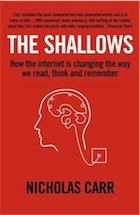 I’m currently reading The Shallows by Nicholas Carr. Andy ordered it and I promptly nicked it, although to be fair he did inform me of its presence in the house, which is possibly asking for trouble.
I’m currently reading The Shallows by Nicholas Carr. Andy ordered it and I promptly nicked it, although to be fair he did inform me of its presence in the house, which is possibly asking for trouble.Because it’s hugely relevant to my research – although my book focuses on memory (and the lack of it) it encompasses ways of thinking and learning. Although Carr’s book is focused on how the Internet and related technologies change how we think, much of it is relevant and the rest of it is just plain interesting.
“I missed my old brain,” comments Carr near the beginning of the book, when he’d started to perceive how he was thinking differently – how he was skimming rather than deep reading, how it got harder to read longer pieces and still maintain concentration. We are used the world of snippets, of hyperlinks, of immediacy. Carr is not saying that modern technologies are bad things – he sees the advantages and the potential of them – but he feels a disquiet about what we might be losing. His is a plea for balance – although it’s true that he seems to see the loss as being inevitable, as we are more and more shaped by the medium of the message, not merely the message itself.
I want to re-read it again after I’ve finished, this time with a pencil in hand – after Andy has read it obviously, I’m not that nasty – and will possibly post a few quotes here and there. Enough to say for now that this is a deeply fascinating book and worth a look if you are interested in the Internet, how we think, or how they relate to each other, which is what this book examines.









